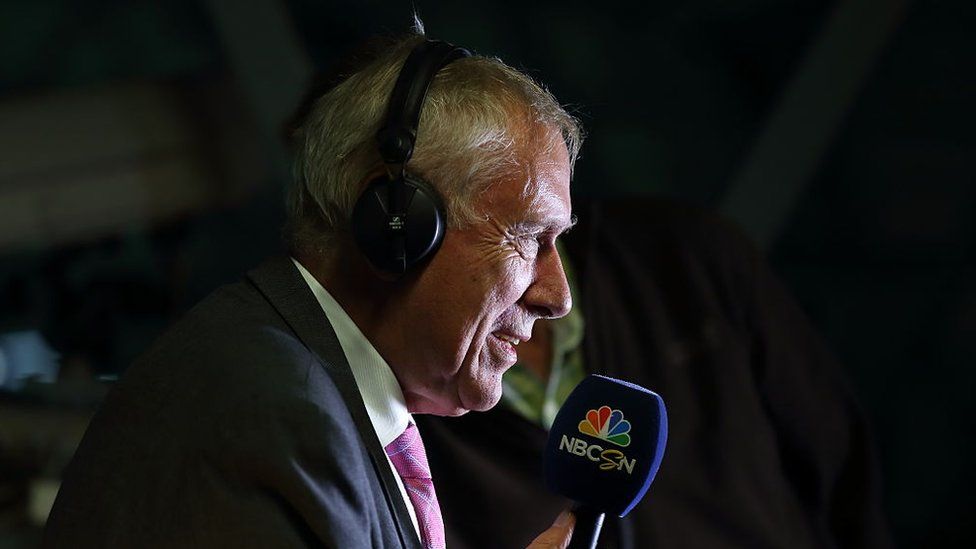
Martin Tyler has commentated on football matches for half a century
By Philippa Roxby
Health reporter
Football commentator Martin Tyler’s voice is his stock in trade.
It has given him a career that has lasted 50 years and been the soundtrack to some of the game’s most dramatic moments – remember “Agüeroooo!” when Manchester City won the Premier League title in 2012?
So when Tyler overused his voice at the 2022 World Cup finals, in Qatar, and doctors realised his vocal chords could have been permanently damaged, it was “frightening”.
But after two operations at St George’s Hospital, in south-west London, and a course of “amazing” speech therapy, the most recognisable voice in football is back – and on television again.
This is the first time the former Sky Sports commentator has talked about nearly losing his voice.
And he pays tribute to the “wonderful people in the NHS” who helped him regain it.
‘Serious help’
“My voice is my identity – it’s the hub of my life,” Tyler, 78, says.
“It didn’t mean anything to me before – but it now means not taking my voice for granted.”
Six weeks after returning from Qatar, Tyler noticed his voice “wasn’t quite right and had lost a bit of power”.
The dry climate and air conditioning could have contributed, he says, and he concedes he was also commentating on a lot of matches on his own, rather than with a colleague.
Hoping it was just the effects of hay fever, Tyler hid the issue and waited for his voice to recover. On some occasions before commentating, he confesses he would stay silent in the lead up to the match and then shout his way through the 90 minutes.
But a few months later, in spring 2023, he realised he needed “serious help”.
Image source, St George’s Hospital
Tyler had surgery and speech therapy at a hospital in south-west London
In an exploratory operation, doctors at St George’s found keratosis – lesions or white patches on the vocal chords in Tyler’s throat – due to the growth of the protein keratin, usually found in skin and hair.
A second operation, to treat the issue, was successful – but he needed speech therapy to return his voice to normal.
“I couldn’t answer the phone, couldn’t talk for a sentence,” Tyler says.
“It was a slow process to recover from the operation,” although he was never in pain.
The thought of not being able to talk to friends and family scared Tyler the most.
And he credits NHS speech therapist Elissa Finn for giving him confidence and reassurance when he was at his lowest.
“She had me blowing bubbles in water and making all sort of strange noises in her sessions,” Tyler says.
Image source, St George’s Hospital
Speech therapist Elissa Finn helped Tyler find his voice again after surgery
“I couldn’t have asked for more from Elissa and from everyone else.”
Ms Finn says losing your voice can be a “scary thing”. She regularly provides counselling and voice therapy to those, such as teachers, singers and barristers, who use their voice in their professional careers.
In Tyler’s case, this started soon after surgery, with breathing and projection exercises over a few months, to help the healing process. This focuses on the vocal folds at the top of the airway which vibrate to create sound.
Ms Finn also advised him to drink plenty of water, little and often, inhale steam and take “voice naps”.
There are lots of reasons why someone can lose their voice, she says. Dry climates, allergies, long flights can all cause dryness and irritation – and some people are more susceptible.
Since returning to the commentary box in October, with Premier League Productions, Tyler has completed 45 games, going from one a month to two in two days.
He says they stood by him when he wasn’t able to do his job and were happy to wait until he’d properly recovered.
It is late after Chelsea’s 6-0 win over Everton and Tyler is already thinking of how he will protect his voice when he gets home after commentating on the match.
He says he’ll drink lots of water and then do chanting number routines in the morning, before commentating on Barcelona and Paris Saint Germain’s Champions League game this evening.
So how long can he continue? “It won’t be the voice that stops me,” Tyler says. “I’ve been very lucky.”
Image source, Martin Tyler
Martin is back to commentating regularly on football after a difficult year








